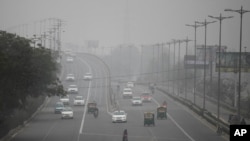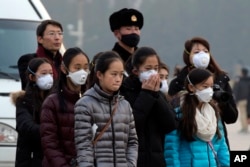Air pollution is responsible for more than 5.5 million premature deaths every year, with more than half of those deaths coming in China and India, according to new research presented Friday.
Scientists warn the early death toll will climb over the next 20 years unless the world does more to fight the problem.
The new study was carried out by researchers from China, India, the United States and Canada, who assembled estimates of air pollution levels in China and India and determined their impact on health.
"Air pollution is the fourth highest risk factor for death globally and by far the leading environmental risk factor for disease," University of British Columbia professor Michael Brauer said Friday. "Reducing air pollution is an incredibly efficient way to improve the health of a population."
China, India
The report concludes that China and India, two of the world's most populous countries, also have the filthiest air in the world.
Experts say small particulate matter emitted into the atmosphere in those countries causes a whopping 55 percent of air pollution-related deaths worldwide.
Dan Greenbaum, president of the Health Effects Institute in Boston, a nonprofit organization that analyzes the health effects from different sources of air pollution, said that "living in areas with higher pollution can cause people to have increased heart and lung disease, and to die prematurely as a result."
Greenbaum noted that indoor cooking contributed significantly to air pollution and the cost in human lives.
“That is a very important issue in both China and India, somewhat less though in China, where they have started to move people on to propane and natural gas to get them away from using coal," he said. "But in India, a very significant number of the people still burn very poor wood and biomass fuels, cow dung and other sources. And that creates major exposures indoors to the mothers and children, for example, who are cooking or are near the stove.”
Some steps taken
In China, meanwhile, the biggest source of air pollution is burning coal, although Greenbaum said the Chinese were starting to do something about the overall problem.
“They’ve tightened their standards for new vehicles, they’ve cleaned up their fuel, and they’ve actually committed to capping and reducing their coal," he said. "But the levels in China in a place like Beijing today are eight to 10 times higher than the healthy standards set by the World Health Organization, so they have a long way to go.”
Unless China adopts more stringent air pollution standards, limiting coal combustion and particulate emissions from factories and power plants, the report estimated that more than 1 million people would die prematurely by 2030.
Economic progress in the United States, Western Europe and Japan also contributed to high levels of air pollution, according to the report.
Medical experts say air pollution leads to heart disease, lung cancer and other respiratory illnesses.
Only high blood pressure, poor diet, and cigarettes kill more people every year than air pollution.
The latest research on air pollution was presented at the conference of there American Association for the Advancement of Science in Washington.





